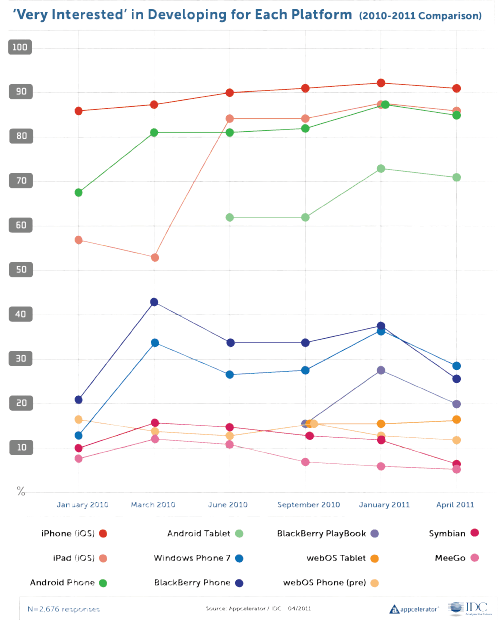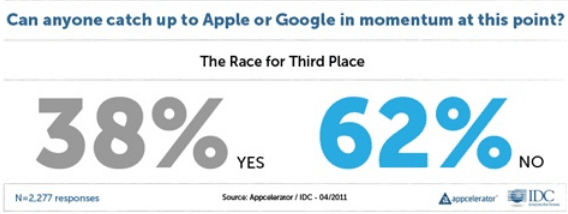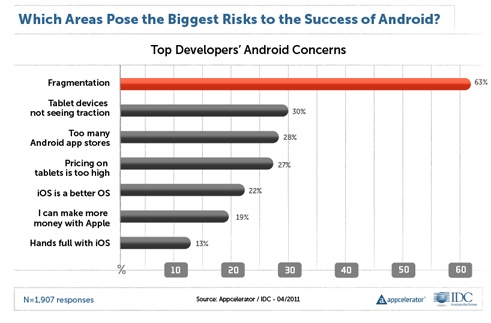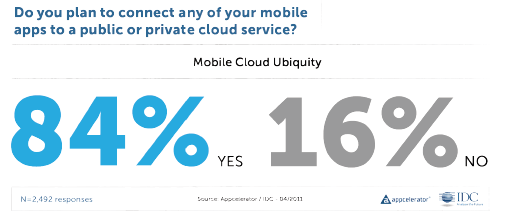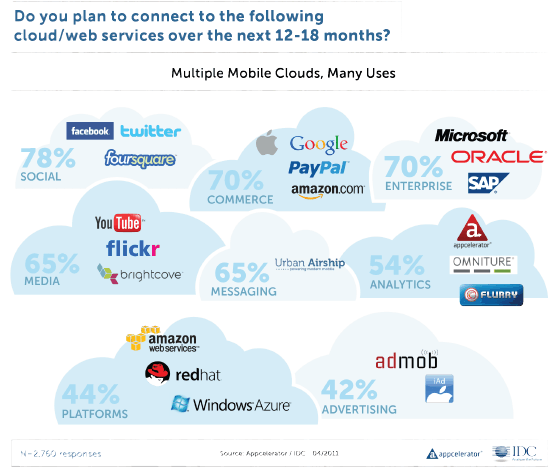| Mobile survey - Apple and Android still way ahead |
| Written by Janet Swift | |||
| Tuesday, 26 April 2011 | |||
|
The latest survey of mobile developers shows that predictions of Android dominance were probably premature and that cloud services are an increasingly important focus.
The results of the latest Appcelerator/IDC developer survey are out and they are being interpreted as showing that interest in developing for Android is in decline (according to Paid Content) or at least levelling out (Read Write Web). This is however needs to be viewed in the context of the highly-optimistic claims being made for the growth of the Android platform at the start of the year when it was widely tipped to overtake iOs as the most popular development platform sometime during the next quarter. As the chart below shows this is now an unlikely outcome.
However, if you examine at the chart (click on it to enlarge it) you'll see a similar decline in interest for all the mobile platforms with the exception of WebOS which is very much a minority player in this league. The worst decline in interest was suffered by Blackberry phone.
However it is also equally clear from the graph that there is a wide distance between Apple and Android platforms and the rest of the field. Another question in the survey asked "Can anyone catch up to Apple or Google in momentum at this point?" with a simple Yes/No answer which had a pretty decisive outcome:
FragmentationCommentators are also picking up on a finding from the survey that 63% of respondents chose Fragmentation in answer to the question "Which areas pose the biggest risks to the success of Android?". However, while this chimes well with news reports that developers have been slow to develop for Android tablets, which in turn have been slow to materialise on the market, it could just be a survey artifact. The question was presumably asked as "choose all that apply" as the percentages add up to 202% so you are forced to pick at least one and Fragmentation may simply be the one you are most prepared to go along with. There were only 1907 responses to this question from among the over 2,700 developers in the survey so almost 30% decided not to answer.
Looking at list of choices what is surprising is how small a percentage some of the responses have. Also factors that might be considered to be major problems for Android - such as the Oracle lawsuit and Google's lack of absolute commitment to open source - are not in the list, but neither is "No major problems" which might have made been an interesting option to include and may have accounted for the high number of "missing" voters. Fragmentation was highlighted as a wider issue in the report which states: When it comes to fragmentation, Android's issues are not the number one concern among developers. In fact, fragmentation in mobile today is six layers deep. Android fragmentation only ranks third behind the fragmentation of skills (eg: Objective-C vs. Java), and the fragmentation of OS capabilities (eg: iOS vs. Android vs. WP7). The report also points to a development that promises to partially address the issue of fragmentation This is interest in the "mobile cloud". There were 2,472 responses to the question about developing for the mobile cloud with a resounding positive result:
The survey goes on to report that: on average, developers and businesses are using 13 of the 44 cloud-enabled and cloud-connected services surveyed in this report. From streaming YouTube videos to accessing mobile payment services, from sending real-time push notifications, to storing information on platform-as-a-service providers like Amazon AWS or Microsoft Azure. The percentages of developers planning to use various cloud-based services over the coming 12-18 months is summarized in this chart:
The report points out the problem with the proliferation of cloud developments: The power of the cloud can only be fully realized when it is available across all devices. and identifies as a key issue the need to address fragmentation to realize the mobile cloud opportunity, cautioning: The imperative for any business now is to determine a mobile strategy that is flexible enough to withstand the complexities and rapid changes coming from both the mobile platform and cloud perspectives.
For this survey, conducted from April 11-13, 2011, Appcelerator and IDC surveyed 2,760 of over 135,000 developers who use Appcelerator's Titanium application development platform on their plans, interests and perceptions of the major mobile and tablet OS providers. Of the respondents 39% live in North America, 41% in Europe, and 20% throughout the rest of the world; 35% classify themselves as independent developers, with the other 65% coming from businesses. Appcelerator developers come from a web development background, so although they build applications with Appcelerator Titanium, they are used to working across multiple platforms.
Further reading:Appcelerator/IDC Q2 2011 Mobile Developer Report Android attracts new users but iOS still dominates Mobile platforms of the world! Android attracts new users but iOS still dominates Mobile developers switching to Android and Windows Phone 7
When it comes to fragmentation, Android’s issues are not the number one concern among developers. In fact, fragmentation in mobile today is six layers deep. Android fragmentation only ranks third behind the fragmentation of skills (eg: Objective-C vs. Java), and the fragmentation of OS capabilities (eg: iOS vs. Android vs. WP7).When it comes to fragmentation, Android's issues are not the number one concern among developers. In fact, fragmentation in mobile today is six layers deep. Android fragmentation only ranks third behind the fragmentation of skills (eg: Objective-C vs. Java), and the fragmentation of OS capabilities (eg: iOS vs. Android vs. WP7). |
|||
| Last Updated ( Tuesday, 26 April 2011 ) |

